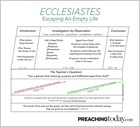Skill Builders
Article
What Is Good Authority?

Authority has not been a popular idea since Genesis 3. Yet it has become especially unpopular of late.
We’re told we cannot trust the authority of the government, the church, the pastor, the media, the scientific establishment, men, and probably not our parents, at least the ones who insist on their rules. Watch out for the Deep State, Big Eva, Mainstream Media, #metoo, #churchtoo, abusive pastors, and the list goes on. Both the political left and right have their list of bad guys. We’re all suspicious.
The trouble is, we cannot live without authority. Should we drive on the right side or left? How does this game work? Who is married to whom? Am I responsible for these kids? What does she do when assaulted?
The solution to bad authority, it turns out, is not no authority, but good authority. Just ask the child who has been abused, the minority who experiences discrimination, or the church member whose conscience is violated. In each case, justice requires some other authority figure to step in and rescue.
Yet how much time have you spent reflecting on what good authority is? Here are seven lessons to teach your congregation about authority—both the good and the bad.
Authority Is a Good and Dangerous Gift
My friend Anthony told me about two of his high school coaches, one good and one bad. The good coach had high expectations, drilled the team, offered correction, worked them hard. Yet he also knew the boys’ limits, sometimes joined them in the drills, let them know he was for them. He cared more about their good than his own ego. And they felt it. Therefore, the boys worked hard and won games.
Meanwhile, Anthony explained the bad coach did just the opposite. He seemed most interested in feeling good about himself. Therefore, he belittled the boys, played favorites, pitted them against each other, and regularly mocked them. For him, they played poorly and lost games.
Authority is a good and dangerous gift. People can use it for great good or great harm. Authority in creation and redemption is good. Authority from the fall is bad. Christians must keep one eye on the good and one eye on the bad.
Authority well used, said King David, is “like the light of morning at sunrise on a cloudless morning, like the brightness after rain that brings grass from the earth” (2 Sam. 23:4).
Meanwhile, authority wrongly used lies egregiously about God, because it tells people that God uses his authority for harm.
Authority Doesn’t Steal Life but Creates It
Bad authority steals, oppresses, uses, usurps, exploits, violates, undermines, destroys, dehumanizes, annihilates. Sometimes it wears an empathetic and understanding face, but it uses you to serve itself.
Good authority creates, builds up, strengthens, disciples, disciplines, corrects, encourages, gives opportunity, gives life, passes out power. Think of God. He created the universe and then exercised rule by authorizing Adam and Eve to rule over the earth. He told them to be fruitful and multiply, subdue the earth and have dominion (Gen. 1:28). He “crowned” them and “put everything under their feet” (Ps. 8).
In other words, good authority goes right to the heart of human existence. God created every one of us to rule. Like the word author-ity, it authors life.
Good authority is the teacher teaching, the mother mothering, the pastor modelling. It says, “Watch me swing this golf club; now you swing it.” “Listen to me play this scale; now you play it.”
One of my daughters can be absent minded. On one occasion, when teaching her to drive, she barreled toward a red light at full speed. She slammed on the breaks only after I said her name a third or fourth time, by that point quite loudly. Arriving home, I said to my wife, “That girl will crash our car.” We briefly wondered if it was foolish to teach her to drive. Just as quickly we said to ourselves, no, this is how people learn. Those with authority have to instruct but then take risks, giving people a chance to make mistakes and grow.
Authority Is Not Unaccountable but Submits to a Higher Authority
Think of the incarnate Son. He only did what the heavenly Father told him to do, only said what the Father told him to say (John 5:19; 12:50). By submitting to the Father’s authority perfectly, the Son proved he was worthy of all authority (Matt. 28:18; 1 Cor. 15:27-28).
Authority and submission are two sides of one coin. By learning to submit we learn to lead. Never put someone into a position of authority who does not know how to submit, who doesn’t know that human authority is never absolute but is always accountable to someone, most of all to God.
A pastor once asked me how to instruct a woman who had shoved her teenage daughter in anger. In addition to apologizing to her daughter, I advised, the daughter needs to see her mother submit to the authorities over her, at least if she wants the daughter to learn to trust her authority again. Good authority submits—even a king (Deut. 17:18-20).
Authority Is Not Unteachable but Seeks Wisdom
Compare the two Pharaohs, one at the time of Joseph and the other at the time of Moses. One sought the counsel even of the slave who had been locked in prison. The other rejected the instruction of an adopted prince raised in the palace. One sought wisdom, the other despised it. And in so doing, one saved his kingdom, the other destroyed it.
Bad authorities believe they know everything they need to know. Good authorities seek out wisdom as if it’s hidden treasure.
So learned NASA. Before the Columbia and Challenger Space Shuttle disasters, the agency had ignored the warnings of their engineers. Afterwards, they spent days in flight readiness reviews, seeking as much counsel as possible. Those reviews made all the difference and saved lives.
Authority Is Neither Permissive nor Authoritarian but Administers Discipline
Not all biblical authority figures possess the right to administer discipline. Yet for those who do, like parents or policemen, good authority uses discipline in a way that strikes a balance in between permissiveness and authoritarianism.
Failing to discipline and draw boundaries for children, for instance, creates narcissists—kids centered on themselves and ruled by their feelings. Boundaries teach a child, “You’re not the center of the universe. You must relinquish some of your desires, conform yourself to wisdom and structures of the world around you, and consider other people.”
Not only that, undisciplined children never learn the humility of accepting fences and disappointments. When college and adulthood then impose those boundaries—a failing grade, an employer’s reprimand, even encountering people with different political perspectives—they claim to be “triggered” and regard themselves as victims. Sociologists in turn write books criticizing the theories that contribute to a victim mentality. Yet the larger problem is the previous generation’s failure to draw boundaries and discipline their children.
Good discipline, like trimming a rose bush, causes people to flourish. It makes the runner run faster, spouses love better. That’s why: “The Lord disciplines the one he loves” and “chastens everyone he accepts as his son” (Heb. 12:6).
At the same time, we all know stories of harsh and abusive authoritarians whose discipline didn’t strengthen, but diminished those under them. Good pastors will take such reports seriously. Pastor, if you hear of an abusive husband, parent, or colleague, it’s our job to act. Don’t forsake due process, but don’t be lazy or play it safe by instinctively siding with the person in a position of power. Those being abused might not have anyone else to intercede for them but us.
Authority Is not Self-Protective but Bears the Costs
The temptation in leadership is to use the control we possess to push the costs downward. My eight-year-old daughter and I both sit comfortably in the living room. I ask her to get me a drink from the refrigerator, since I know she’s compliant and—at this age—happy to serve me. Yet notice what I’m doing. I’m using my authority to push the very light costs of getting out of a chair downward in the hierarchy to her. You might argue that this serves a good purpose in her life of teaching her to honor her father. Yet whether that’s true or not, I know my heart in that moment isn’t seeking her good. It’s just being lazy. I want to avoid the cost, so I pass it on to her.
No doubt, part of being in authority is distributing the costs of labor to different parts of a body or organization. Good leaders will delegate.
Still, there is a sense in which good leaders seek, as best as they can, to minimize the costs for those beneath them, all the while absorbing what costs they can upward. They want to spare those beneath them those difficulties and hardships. As I said, that’s the job.
In that sense, being “the boss” often is and should be one of the hardest jobs in any group. How often is the school principal the first to arrive and the last to leave the school building on any given school day. So with the hard-working father. So with the coach.
Furthermore, isn’t this precisely what we see in Jesus’ use of authority, leading up to the Cross (Phil. 2:5-11)?
None of These Rules Matter if You’re the Pharisee and Not the Tax Collector
To some degree, we misuse our authority by lording it over others. We use our leadership to serve ourselves rather than others. For us to begin anywhere other than acknowledging and confessing these things would be to mimic the pharisee who thanked God he wasn’t like the tax collector (Luke 18:9-14).
Part of what’s wrong on this planet is that each one of us assumes, “I’ve used my authority relatively well,” when the Bible tells us over and over, “No, only one man used his authority perfectly well.” His name wasn’t Adam or Abraham, Moses or David, Miriam or Mary, Peter or Paul. It is Jesus, who “came not to be served but to serve, and to give his life as a ransom for many” (Mark 10:42–45).
Therefore, if we think you can simply adopt the six lessons above, we will remain proud. And if we remain proud, we will eventually use our authority in a way that hurts or belittles or undermines those whom we lead. We will use our authority wrongly, even if we dress it up with nice manners and lipstick. As Jesus said, a good tree bears good fruit, and a bad tree bears bad. We need new natures, so that we can lead out of those new natures.
To gain new natures, we must begin by getting low, confessing our sins, and putting our hope in Christ. This requires recognition and confession at the deepest levels of who we are, not just “Lord God, I have once or twice misused my authority. Oops. Sorry for the slipup,” but, “Lord God, I am, by fallen nature, a misuser of authority, and I will misuse it repeatedly apart from your grace.”
It requires repentance, faith, and looking to Christ. “Blessed are the meek, for they will inherit the earth” (Matt. 5:5).
Editor’s Note: If you like what Jonathan outlines here and want to go more in-depth on these ideas make sure you purchase his book, Authority: How Godly Rule Protects the Vulnerable, Strengthens Communities, and Promotes Human Flourishing. It is a practical, applicable, and engaging guide for all readers, but especially preachers.
Jonathan Leeman is the editorial director for 9Marks and cohost of the Pastors’ Talk podcast.









